Book contents
- Frontmatter
- Contents
- List of plates
- Acknowledgments
- List of abbreviations
- Prologue and introduction
- 1 Background and early years, 1897–1919
- 2 Vienna: research, engagement and marriage, 1919–1923
- 3 England and the London School of Economics, 1923–1937
- 4 Cambridge, 1937–1939: the Whewell Chair
- 5 The war years, Part I: September 1939–January 1941
- 6 The war years, Part II: February 1941–March 1942
- 7 The war years, Part III: April 1942–December 1944
- 8 Human rights
- 9 The years of practice, 1945–1950
- 10 1950–1954
- 11 The International Court of Justice, 1955–1960
- Epilogue: the man
- Appendix 1 The published writings of Sir Hersch Lauterpacht
- Appendix 2 Biographical and academic writings on Sir Hersch Lauterpacht
- Appendix 3 Obituaries of Sir Hersch Lauterpacht
- Appendix 4 Chronology of significant events in the life of Sir Hersch Lauterpacht
- Index
11 - The International Court of Justice, 1955–1960
Published online by Cambridge University Press: 01 June 2011
- Frontmatter
- Contents
- List of plates
- Acknowledgments
- List of abbreviations
- Prologue and introduction
- 1 Background and early years, 1897–1919
- 2 Vienna: research, engagement and marriage, 1919–1923
- 3 England and the London School of Economics, 1923–1937
- 4 Cambridge, 1937–1939: the Whewell Chair
- 5 The war years, Part I: September 1939–January 1941
- 6 The war years, Part II: February 1941–March 1942
- 7 The war years, Part III: April 1942–December 1944
- 8 Human rights
- 9 The years of practice, 1945–1950
- 10 1950–1954
- 11 The International Court of Justice, 1955–1960
- Epilogue: the man
- Appendix 1 The published writings of Sir Hersch Lauterpacht
- Appendix 2 Biographical and academic writings on Sir Hersch Lauterpacht
- Appendix 3 Obituaries of Sir Hersch Lauterpacht
- Appendix 4 Chronology of significant events in the life of Sir Hersch Lauterpacht
- Index
Summary
On 7 October 1954, Hersch was elected a judge of the International Court of Justice as successor to Sir Arnold McNair who was reaching the end of his nine-year term and did not wish to stand for re-election. This ushered in the last and in some ways the most significant period of Hersch's life. Great as his reputation was by then, on the basis of his four major books, his editions of Oppenheim, editorship of the British Year Book of International Law and membership of the International Law Commission, it is to his separate and dissenting opinions as a judge of the Court that one looks for the ultimate practical implementation of his scholarship.
The ICJ was at that time regarded as the most important international tribunal in the world. Indeed, with the possible exception of the European Court and the European Commission of Human Rights, in its limited sphere, it had no competitor. It was described in Chapter xiv of the Charter of the United Nations as ‘the principal judicial organ’ of that body. Its jurisdiction extended to any dispute between States that they might agree, in one or another form, to submit to it. It did not have, and still has not, any jurisdiction over cases initiated by individuals. But it also possessed, and still possesses, the competence to give advisory opinions at the request of various organs of the UN and its specialised agencies – requests most often made by the General Assembly or the Security Council.
- Type
- Chapter
- Information
- The Life of Hersch Lauterpacht , pp. 373 - 422Publisher: Cambridge University PressPrint publication year: 2010



